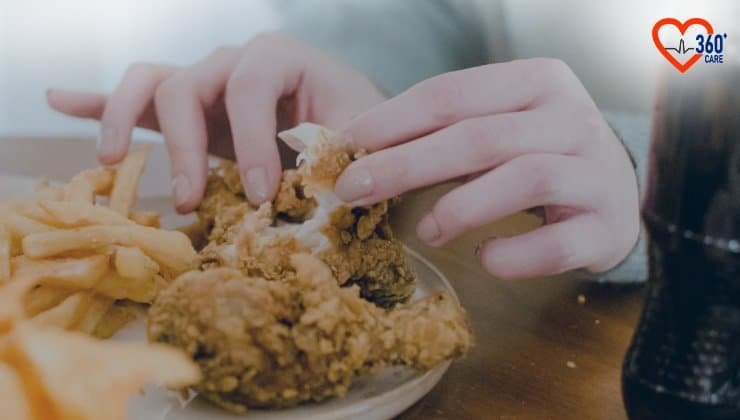Foods to Avoid After Angioplasty
With the increase in sedentary lifestyles, there is a rise in heart-related issues and angioplasty to restore the blood flow to the heart. While angioplasty can significantly improve heart function, adopting certain dietary changes is required for long-term heart health.
Let us explore more about foods to eat and avoid after angioplasty and a sample 7-day dietary Indian meal chart!
What is Angioplasty?
Angioplasty is a minimally invasive medical procedure that helps open the blocked arteries and restore the blood flow to your heart by inflating a tiny balloon in the clogged artery. It may also require the placement of a stent to keep the arteries open.
It helps improve blood flow to the heart, reduce chest pain and lower the risk of heart attacks.
Why Does Diet Matter After Angioplasty?
Because open heart surgery is an invasive procedure and requires a heart-lung machine, there is a greater chance of some risks.
Infection, bleeding, blood clots, stroke, abnormal heartbeats, or lung issues are a few possible complications.
What is Closed Heart Surgery?
Your body needs time to heal and recover after an angioplasty. A well-maintained diet after angioplasty plays an important role in the speedy recovery process. If there is any negligence towards a lifestyle, it may result in restenosis, re-narrowing of the opened blood vessels and other heart-related complications.
A heart-healthy diet helps in maintaining a healthy heart by
- Reducing the risk of complications
- Lowering cholesterol levels
- Controlling blood pressure
- Reducing inflammatory markers
- Managing weight
The Role Of A Healthy Diet In Post-Angioplasty Recovery
Nutrition plays an important role in the recovery process after angioplasty. It helps in better outcomes post-surgery
A healthy diet helps in
- Promoting wound healing
- Preventing the occurrence of infection
- Providing adequate energy to help in recovery
- Preserving lean body mass
- Preventing dehydration
Foods to Avoid After Angioplasty
Here are a few foods to avoid after angioplasty to prevent complications and ensure a smooth recovery:
- Processed Meats
Processed meats, including bacon, sausages, salami, ham, and hot dogs are loaded with sodium and unhealthy preservatives and may damage your heart.
- Sugary Snacks And Refined Carbohydrates
Sweets, pastries, and white bread may spike the blood sugar levels and triglyceride levels which in turn can impair cardiac function.
- Foods Rich In Trans Fat
Intake of foods rich in trans-fats and saturated fats, including fried foods, baked goods, and high-fat meals increase the cholesterol levels which in turn increase the risk of developing coronary artery disease.
- Excessive Salt Foods
Foods rich in excessive salt will increase blood pressure and contribute to increasing the strain on the heart.
Foods to Eat After Angioplasty
Health professionals recommend a balanced diet rich in vitamins, antioxidants, minerals, and dietary fibre post angioplasty to lower the risk of developing cardiovascular disease.
Here are a fe heart-friendly doods to eat after angioplasty:
- Fruits And Vegetables
A variety of fresh fruits and vegetables are rich in essential vitamins, minerals, fibre, and antioxidants and help in improving heart health. Your nutritionist may recommend at least 4 to 5 servings of fruits and vegetables per day.
- Nuts
Nuts are rich in fibre, proteins, and essential fats that are a heart-friendly snack.
- Whole Grains
Whole grains, including rolled oats, whole wheat, barley, corn, and quinoa are rich in fibre and complex carbohydrates that help in controlling your blood sugar and cholesterol levels. It helps in keeping you full for a longer time.
- Lean Protein Sources
Incorporating a variety of lean meats, poultry, fish, eggs, and legumes helps in supporting muscle repair and growth.
Legumes are plant-based foods that are good sources of low-fat protein that keep you full for a longer time and reduce the risk of heart disease.
- Healthy Fats
Healthy fats, including avocados, nuts, and seeds can be incorporated to support heart health. Also, you may include vegetable-based oils, including olive oil, peanut oil, sesame oil, and groundnut oil.
7-Day Indian diet chart after angioplasty
The dietary recommendations of individuals may vary based on their needs, health condition, and lifestyle modification. It is best to consult with a dietician for a customized plan.
| Breakfast | Mid-morning diet | Lunch | Evening snack | Dinner | |
| Day 1 | Vegetable upma with a side of curd | Handful of almonds | Roti with lentil soup (dal) and a side of mixed vegetables | Sprouts salad with lemon | Dal khichdi with a side of yoghurt |
| Day 2 | Idli with sambhar | Fruit (apple or orange) | Chickpea curry and brown rice and a salad | Cucumber slices with yoghurt | Lenti soup with roti and mixed vegetable curry |
| Day 3 | Dalia with vegetables | Buttermilk | Mixed vegetable curry with roti and a side of dal | Roasted channa a handful | Broken wheat porridge |
| Day 4 | Poha (flattened rice) with vegetables | Cashews or walnuts | Jowar roti with seasonal vegetables and salad | Fruit salad | Roti and okara stir fry |
| Day 5 | Oats porridge with fruits and nuts | Coconut water | Vegetable Khichdi with a side of yoghurt | Roasted makhana | Jeera rice with moong dal |
| Day 6 | Ragi dosa with chutney | Herbal tea | Spinach dal with brown rice and a side of cucumber-tomato salad | Buttermilk | Masoor dal with quinoa |
| Day 7 | Moong dal cheela with mint chutney | Fruit chaat | Kadhi rice |
Table: A sample 7-day Indian diet plan post angioplasty. Non-vegetarians may include eggs and lean meat sources for protein.
How Foods Affect Your Heart After Angioplasty?
Diet has shown a relationship with heart health.
Eating excessive calorie-rich foods may lead to obesity which leads to storing the extra amount of fat in the inner linings of blood vesels. The cholesterol deposition over time may lead to obstruction in blood flow and lead to further heart related complications.
So, it is important to pay attention to diet after angioplasty to avoid re-narrowing of the blood vessels and prevent block formation.
Common Post-Angioplasty Mistakes to Avoid
A few post-angioplasty mistakes to avoid are
- Not staying hydration: Dehydration may affect the healing process after the angioplasty. Keeping yourself well hydrated helps in expelling toxins from the body.
- Not practising portion control: Eating large portions of unhealthy foods may lead to weight gain, increased blood pressure, and higher cholesterol levels putting more strain on the heart. Having small and distributed meals throughout the day will help in recovery process.
- Not following a balanced diet: Skipping meals or consuming calorie dense foods and processed foods may affect the recovery process. Including a good portion of vegetables and fruits will help in the healing process.
Conclusion
A heart-healthy diet after angioplasty is required to help with recovery and long-term heart health. Incorporating fresh fruits, vegetables, lean proteins, nuts, seeds, legumes, and whole grains in the diet after angioplasty will help in maintaining heart health.For any queries regarding the diet after angioplasty, consult Dr Nikhil, a renowned cardiac surgeon with global expertise of Heart360 Care.
Frequently Asked Questions
The best diet after angioplasty includes a diet with plenty of fruits, vegetables, whole grains, lean proteins, and healthy fats. It is essential to avoid foods high in trans fats, sodium, refined sugars, and processed meats.
Foods high in saturated fats, trans fats, and excessive sodium are to be avoided. Also, reduce your intake of processed foods, fatty red meats, full-dairy meat, sugary snacks, and beverages
Proper hydration is required after angioplasty along with nutritive food. Clear liquids and sem-solid diet are given immediately after the surgery to expel the contrast liquid used in the procedure. Once the patient resumes back to normal diet, it is important to stay hydrated to maintain heart health.
It is important to consult your healthcare provider before resuming drinking after angioplasty. However, excessive alcohol should be avoided as it may negatively affect your heart.









